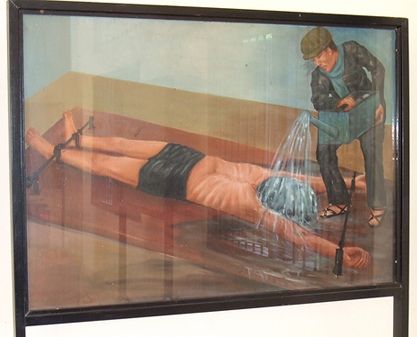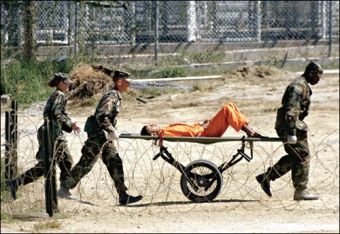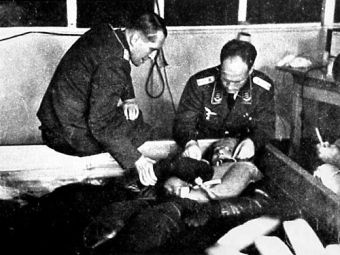
Publisher:
Bonnie King
CONTACT:
Newsroom@Salem-news.com
Advertising:
Adsales@Salem-news.com

~Truth~
~Justice~
~Peace~
TJP
Jul-11-2010 20:31

 TweetFollow @OregonNews
TweetFollow @OregonNews
Physicians Without Morals
Ralph E. Stone Salem-News.comWe expect our physicians and psychologists to maintain a high standard of ethics, a high duty to their patients, and often to put the interests of their patients ahead of their own interests.
 al Jazeera cameraman Sami al-Haj was taken captive and held for years by the Bush Administration at Guantanamo. This is his illustration. To learn more about Sami's amazing survival story, visit: Sami al-Haj: the banned torture pictures of a journalist in Guantánamo |
(SAN FRANCISCO) - There is increasing evidence that United States physicians, psychologists, nurses, and medics have been complicit in torture and other illegal procedures in Iraq, Afghanistan, and Guantánamo.
They violated one of the principal precepts of medical ethics: "First, do no harm." Government physicians and psychologists who participated in and authorized the torture of detainees have escaped discipline, accountability or even internal investigation.
The Pentagon, the C.I.A., state licensing boards, and professional medical societies have not initiated any action to investigate, much less discipline, these individuals. Presumably these health care professionals continue to treat an unknowing public with little or no fear of prosecution or disciplinary action.
Background
On April 16, 2009, President Obama released four top secret memos that allowed the CIA under the Bush administration to torture al-Qaeda and other suspects held at Guantánamo and secret detention centres round the world.
According to the memos, ten techniques were approved: attention grasp (grasping the individual with both hands, one hand on each side of the collar opening, in a controlled and quick motion); walling (in which the suspect could be pushed into a wall); a facial hold; a facial slap; cramped confinement; wall standing; sleep deprivation; insects placed in a confinement box (the suspect had a fear of insects); and the waterboarding.
 Khmer Rouge waterboarding. Courtesy: unattributable.com |
In waterboarding the individual is bound securely to an inclined bench, which is approximately four feet by seven feet. The individual's feet are generally elevated. A cloth is placed over the forehead and eyes. Water is then applied to the cloth in a controlled manner which produces the perception of suffocation and incipient panic.
In the now-discredited August 2002 memorandum from then Assistant Attorney General Jay Bybee to then White House Counsel Alberto Gonzalez narrowly defined physical torture as requiring pain "equivalent in intensity to the pain accompanying serious physical injury, such as organ failure, the permanent impairment of a significant bodily function, or even death."
And we all remember former Vice President Cheney's comment that: "enhanced interrogation techniques" (a euphemism for torture) sanctioned by the Bush administration are not torture and dismissed criticism as "contrived indignation and phony moralizing."
Under, the "Yamashita standard," based upon the precedent set by the United States Supreme Court in the case of Japanese General Tomoyuki Yamashita (In re Yamashita, 327 U.S. 1 (1946). He was prosecuted in 1945, in a still controversial trial, for atrocities committed by troops under his command in the Philippines. Yamashita was charged with "unlawfully disregarding and failing to discharge his duty as a commander to control the acts of members of his command by permitting them to commit war crimes." Would the "Yamashita standard" apply to those in the chain of command right up to then President Bush as commander-in-chief of the armed forces, Donald Rumsfeld, his Secretary of Defense, and the directors of the Central Intelligence Agency?
However, Obama has ruled out prosecutions against those who had been involved in torture. It is a "time for reflection, not retribution," he said.
Defining Medical Torture

Medical torture (also known as a medical interrogation) describes the involvement and sometimes active participation of medical professionals in acts of torture, either to judge what victims can endure, to apply treatments which will enhance torture, or as torturers in their own right. Medical torture may involve the use of their expert medical knowledge to facilitate interrogation or corporal punishment, in the conduct of torturous human experimentation or in providing professional medical sanction and approval for the torture of prisoners. The term also covers torturous scientific (or pseudo-scientific) experimentation upon unwilling human subjects.
Pentagon top health official doctor William Winkenwerder Jr. in 2005 allowed military physicians to participate in torture and share medical records with interrogators so long as a detainee wasn't officially their patient. Winkenwerder got an award from the AMA that year for outstanding contributions "to the betterment of the public health."
The AMA has refused to condemn Pentagon and CIA torture practices and made no response when in Feb., 2006, the U.N. Commission on Human Rights condemned U.S. doctors for having "systematically" participated in detainee abuse. Bioethicist Steven Miles of the University of Minnesota Medical School said the U.N. condemnation should have been "a call to arms" yet "the AMA said nothing."

Yet, according to an AMA opinion, "Physicians must oppose and must not participate in torture for any reason. Participation in torture includes, but is not limited to, providing or withholding any services, substances, or knowledge to facilitate the practice of torture. Physicians must not be present when torture is used or threatened." (AMA Code of Medical Ethics opinion 2.067)
According to the American Pychological Association: " BE IT RESOLVED that the APA reaffirms its 1986 condemnation of torture and other cruel, inhuman, or degrading treatment or cruel, inhuman, or degrading punishment wherever it occurs." (American Psychologists Ethical Principles of Psychologists and Code of Conduct (2006)). However, in May, 2006, APA President Steven Sharfstein noted that psychiatrists "wouldn't get into trouble" if they heeded military orders despite the APA's advice that members should not directly assist in interrogations, which he added should not be considered "an ethical rule."
Torture is prohibited under international law and the domestic laws of most countries. Although, Amnesty International estimates that at least 81 world governments currently practice torture, some openly.
Nuremberg "Doctor's Trial"
 Courtesy: unattributable.com |
The "doctor's trial." one of many trials at Nuremberg is somewhat instructive. Twenty-three German physicians who willingly participated in the Nazi program to euthanize persons deemed "unworthy of life" (the mentally ill, mentally retarded, or physically disabled or who conducted pseudoscientific medical experiments utilizing thousands of concentration camp prisoners without their consent.
Most died or were permanently crippled as a result. Most of the victims were Jews, Poles, Russians, and also Roma (Gypsies). After almost 140 days of proceedings, including the testimony of 85 witnesses and the submission of almost 1,500 documents, the American judges pronounced their verdict on August 20, 1947. Sixteen of the doctors were found guilty. Seven were sentenced to death. They were executed on June 2, 1948.
The tribunal rejected the defense that the accused were only following orders issued by others. Instead, individuals were held responsible for their actions, although for those found guilty, the tribunal indicated that a person's place in the hierarchy of authority and the nature of those orders could be considered as mitigating circumstances in the determination of sentencing.
But you say, these German doctors' actions resulted directly or indirectly in thousands of deaths and the crippling of prisoners. Is there a difference in kind or is the difference really one of degree?
Disobeying Unlawful Orders
The Constitution states (Article VI) states:
This Constitution, and the Laws of the United States which shall be made in Pursuance thereof; and all Treaties made, or which shall be made, under the Authority of the United States, shall be the supreme Law of the Land; and the Judges in every State shall be bound thereby, any Thing in the Constitution or Laws of any State to the Contrary notwithstanding.
Article 3 of the Geneva Conventions states in pertinent part:
In the case of armed conflict not of an international character occurring in the territory of one of the High Contracting Parties, each party to the conflict shall be bound to apply, as a minimum, the following provisions:
1. Persons taking no active part in the hostilities, including members of armed forces who have laid down their arms and those placed hors de combat by sickness, wounds, detention, or any other cause, shall in all circumstances be treated humanely, without any adverse distinction founded on race, colour, religion or faith, sex, birth or wealth, or any other similar criteria.
To this end the following acts are and shall remain prohibited at any time and in any place whatsoever with respect to the above-mentioned persons:
(a) Violence to life and person, in particular murder of all kinds, mutilation, cruel treatment and torture;
(b) Taking of hostages;
(c) Outrages upon personal dignity, in particular, humiliating and degrading treatment."
Article 3 is straightforward and clear. Under Article VI of the Constitution, it forms part of the supreme law of the land.
Thus, a member of the military is personally held responsible for all of his or her actions, in all countries, at all times and places. "I was only following orders" is not a defense.
To disobey an unlawful order seems clear in principal, but not always in practice. A military physician is subject to a potential moral conflict between healing, on the one hand, and obeyance to the military hierarchy and the command structure, on the other. American doctors at prisons in Iraq, Afghanistan, Guantánamo, and elsewhere, are supposed to know their medical responsibility to document injuries and raise questions about possible abuse. Yet, those physicians and other medical personnel are part of a command structure that permitted, encouraged, and sometimes committed torture to a degree that it became the norm in the prison environment and to which they were expected to comply.
The Nazis provided the most extreme example of physicians becoming socialized to atrocity. In addition to cruel medical experiments, many Nazi doctors, as part of military units, were directly involved in killing. To reach that extreme point, they underwent a sequence of socialization: first to the medical profession, a self-protective guild; then to the military, where they became subjected to the chain of command; and finally to camps such as Auschwitz, where adaptation included assuming leadership roles in the death factory. Most of these physicians were ordinary people who had killed no one before joining murderous Nazi institutions. They were corruptible and certainly responsible for what they did, but they became murderers mainly in atrocity-producing settings.
Conclusion
Those who sanctioned torture either don't know the law, or advocated flaunting the law. Human torture is not only morally unacceptable – it is also a crime. Waterboarding, for example, is explicitly prohibited by the Convention Against Torture and the Geneva Conventions. Using torture places us in the same company as history's infamous torturers. Waterboarding, for example, dates back to the Dark Ages. By using torture, we lost any ideological advantage we might have had -- the promotion of democracy, freedom and human rights. We became the thugs our enemies say we are.
Where does that leave us as a society if we do not punish those who carry out unlawful orders? We expect our physicians and psychologists to maintain a high standard of ethics, a high duty to their patients, and often to put the interests of their patients ahead of their own interests. Failure to meet these standards is an unconscionable disservice to the thousands of ethical physicians and psychologists in and out of the military.
 Salem-News.com writer Ralph E. Stone was born in Massachusetts. He is a graduate of both Middlebury College and Suffolk Law School. We are very fortunate to have this writer's talents in this troubling world; Ralph has an eye for detail that others miss. As is the case with many Salem-News.com writers, Ralph is an American Veteran who served in war. Ralph served his nation after college as a U.S. Army officer during the Vietnam war. After Vietnam, he went on to have a career with the Federal Trade Commission as an Attorney specializing in Consumer and Antitrust Law. Over the years, Ralph has traveled extensively with his wife Judi, taking in data from all over the world, which today adds to his collective knowledge about extremely important subjects like the economy and taxation. You can send Ralph an email at this address stonere@earthlink.net
Salem-News.com writer Ralph E. Stone was born in Massachusetts. He is a graduate of both Middlebury College and Suffolk Law School. We are very fortunate to have this writer's talents in this troubling world; Ralph has an eye for detail that others miss. As is the case with many Salem-News.com writers, Ralph is an American Veteran who served in war. Ralph served his nation after college as a U.S. Army officer during the Vietnam war. After Vietnam, he went on to have a career with the Federal Trade Commission as an Attorney specializing in Consumer and Antitrust Law. Over the years, Ralph has traveled extensively with his wife Judi, taking in data from all over the world, which today adds to his collective knowledge about extremely important subjects like the economy and taxation. You can send Ralph an email at this address stonere@earthlink.netArticles for July 10, 2010 | Articles for July 11, 2010 | Articles for July 12, 2010


Salem-News.com:



Terms of Service | Privacy Policy
All comments and messages are approved by people and self promotional links or unacceptable comments are denied.
Vic July 12, 2010 10:28 am (Pacific time)
Good article! Interesting and well-written! Thank You !
[Return to Top]©2026 Salem-News.com. All opinions expressed in this article are those of the author and do not necessarily reflect those of Salem-News.com.